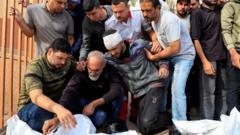As violence intensifies, the plight of civilians in Gaza worsens, prompting calls for aid and intervention.
Concerns Mount Over Gaza's Humanitarian Crisis Amid Escalating Conflict

Concerns Mount Over Gaza's Humanitarian Crisis Amid Escalating Conflict
US Senator Marco Rubio expresses alarm over the humanitarian situation in Gaza as airstrikes escalate.
The humanitarian situation in Gaza has reached a critical point, drawing serious concerns from US Senator Marco Rubio during a recent interview with the BBC. Rubio noted that the US is "troubled" by the deteriorating conditions faced by civilians, particularly in light of the recent airstrikes that reportedly resulted in the deaths of at least 114 Palestinians on Thursday alone.
When questioned about the Trump administration's unwavering support for Israel amid rising casualties, Rubio reiterated the necessity for Hamas to surrender and release hostages, emphasizing that peace remains unattainable as long as the group persists. “While we affirm the right of Israel to defend itself, we cannot overlook the suffering of the people in Gaza. There are opportunities to provide humanitarian aid,” he stated.
The situation in Gaza has been exacerbated by a complete Israeli blockade on food and humanitarian supplies, ongoing for 10 weeks. Israeli military operations have increased, targeting what they claim are Hamas militants and related infrastructure as the ground offensive is set to expand.
Rubio's remarks were made following a meeting of NATO foreign ministers in Turkey, hinting at a debated proposal involving private contractors to establish aid collection points, which has been rejected by the UN as unethical. Meanwhile, indirect negotiations are underway for a possible ceasefire and hostage exchange between Hamas and Israel, with former President Donald Trump visiting the region to support these efforts.
Hamas has accused Israeli Prime Minister Benjamin Netanyahu of complicating mediation endeavors through deliberate military escalations. An Israeli spokesman affirmed the nation’s commitment to negotiations, albeit under continued military pressure on Hamas.
As airstrikes intensified, residents of southern Gaza, particularly in Khan Younis, experienced the deadliest bombardments seen since the escalation began nearly two months ago. Reports indicate that families, including women and children, were decimated in strikes targeting makeshift shelters. The local Nasser hospital has been overwhelmed to the point where its mortuary is filled beyond capacity, with injured being treated under dire conditions due to a shortage of resources.
Amid the chaos, personal stories emerge from the rubble. One grieving mother recounted the loss of her two infant sons in an airstrike, reflecting the daily tragedies faced by families. Additionally, witnesses reported heavy casualties in northern Gaza, with multiple airstrikes hitting homes and public facilities during routine hours.
In an effort to address the critical shortages of food and medical supplies, a US-backed group plans to launch operations in Gaza within a fortnight, amid widespread criticism of the US-Israeli strategy for aid distribution. The Gaza Humanitarian Foundation has urged Israel to permit the resumption of UN aid shipments, although the UN remains firm against participation in the proposed plan.
For the past 10 weeks, Israel has maintained a blockade that has led to predictions from the UN that half a million people in Gaza could face starvation. Israel claims compliance with international laws but remains under scrutiny for the humanitarian impact of its military campaign, launched in response to Hamas’s cross-border attack on October 7, 2023, which resulted in significant Israeli casualties.
The scale of the ongoing crisis has been monumental, with reports indicating over 53,000 fatalities in Gaza since the conflict reignited, underscoring the urgent need for effective humanitarian intervention.






















